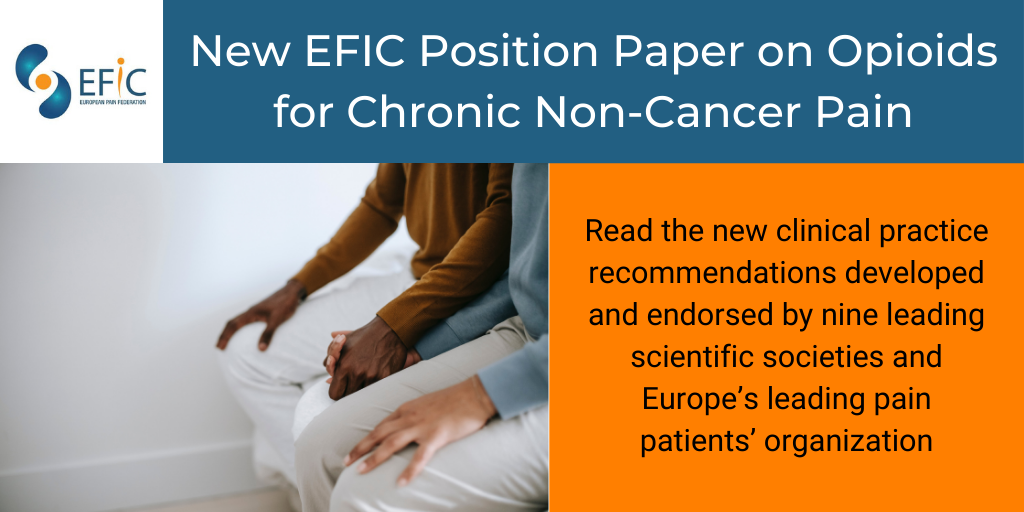European scientific community publishes consensus recommendations on opioid use for chronic non-cancer pain
- To allay concerns over an opioid crisis, as in the US, the European scientific community has reviewed evidence on using opioids to treat chronic non-cancer pain
- New clinical practice recommendations have been developed and endorsed by nine leading scientific societies and Europe’s leading pain patients’ organisation
- Recommendations propose opioids should not be prescribed for many chronic pain conditions, and serve only as a second- or third-line treatment in all others
Brussels, 3 March 2021 – Under the umbrella of the European Pain Federation (EFIC), a gathering of nine European scientific societies and a leading patients’ organisation has developed new clinical recommendations for opioid use in treating chronic non-cancer pain (CNCP).
The new recommendations advise that opioids should not be prescribed for people with chronic primary pain as they do not work for these patients. Moreover, opioids should also not be used as a ‘first-line therapy’ for chronic secondary pain syndromes. Instead, doctors should first use non-opioid medications, or established non-pharmacologic therapies (eg exercise, psychological therapies), and only consider prescribing opioids if these first-line therapies do not work, are not tolerated, or contra-indicated.
Chronic primary pain is defined by the World Health Organisation as pain that lasts more than three months, causing significant emotional distress or functional disability, but which cannot be explained by another specific medical condition. Examples include fibromyalgia, chronic migraine, irritable bowel syndrome and non-specific low-back pain. Chronic secondary pain, by contrast, is pain due to a defined medical condition, such as following surgery or injury, internal diseases, diseases of the muscles, bones or joints, or nerve damage.
Up to a quarter of Europeans suffer chronic pain and, in around 80% of those cases, the pain is not related to cancer. In the past, opioids have frequently been prescribed for CNCP because people assume they are the most potent pain medication, coupled with a lack of awareness about the potential serious harm resulting from taking opioids.
Opioid prescriptions have increased over the past decade in some European countries which has caused concerns. The new recommendations therefore aim to provide safer and more effective care for people with CNCP, to improve communication between clinicians and people with chronic pain about the benefits and harms of using prescription opioids for chronic pain, and to give guidance to doctors on appropriate opioid use as well as decrease harmful opioid use.
The recommendations state that, before prescribing opioids, clinicians should establish treatment goals with patients, including realistic goals for daily physical function and pain. In addition, before starting – and regularly throughout the opioid therapy – doctors should discuss the known harms and realistic benefits of opioid therapy (and of alternatives) with their patients. And if opioids are used to treat chronic secondary pain, they should always be combined with non-opioid pain killers and non-opioid therapies.
Doctors should closely monitor patients after starting treatment with opioids and the therapy should only continue if there is clinically meaningful improvement in pain and physical function that outweighs the risks to their patient’s safety.
EFIC’s new recommendations advise starting low and going slow. At the outset, clinicians should prescribe the lowest effective dose: less than 50 morphine milligram equivalents (MME) a day. They should also avoid increasing the dosage above 90 MME/day, or carefully justify any decision to do so.
Opioid therapy should stop if the goals agreed at the beginning of the treatment are not being met, or if intolerable adverse events happen. Treatment should also stop if the goals can be achieved through other non-opioid treatments, or if there are concerns about a patient becoming dependent.
Brona Fullen, EFIC President said: “As the leading pain science organisation in Europe, it is crucial that EFIC sets the agenda on issues such as opioids, where there are growing societal concerns. These recommendations clarify what role opioids should play in chronic pain management, but also what role multimodal treatment plays.”
The paper’s lead author, Professor Winfried Häuser, commented: “The debate on opioid-prescribing for chronic non-cancer pain has become polarized: opioids are either seen as a dangerous risk for all patients, leading to addiction and deaths or they are promoted as most potent pain killers for any type of pain. This paper seeks to navigate the scientific and clinical evidence and provides recommendations for when opioids could be beneficial and when not for chronic non-cancer pain. Opioids are still important in the management of chronic non-cancer pain – but only in some selected chronic pain syndromes and only if established non-pharmacological and non-opioids analgesics have failed or are not tolerated.”
Immediate Past President and a co-author of the paper, Professor Bart Morlion said: “We have now reached a new European scientific consensus on opioid use for chronic non-cancer pain, which recommends that opioids should not be prescribed for many chronic pain conditions and serve only as a second- or third-line treatment in all others.”
For additional materials including videos, photos, author biographies and and opioid treatment infographic, visit the press area of our website at https://europeanpainfederation.eu/press-area/
The paper can be found: here
